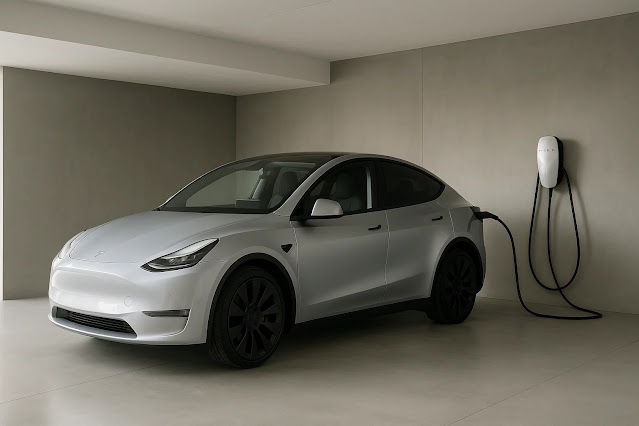Why Home EV Charging Matters More Than Ever
Electric vehicles are taking over. With EV adoption rising across the U.S., UK, and Gulf countries, home EV charger installation is quickly becoming a must-have for homeowners, renters, and landlords alike.
Public charging stations are growing, but the convenience of plugging in at home and waking up to a full battery can’t be beat. Whether you drive a Tesla, Rivian, Hyundai, or any electric model, installing a Level 1 or Level 2 home charger means no waiting in lines, no paying surge fees—and better control over your daily energy costs.
"Pairing your EV charger with smart home tools like a Nest thermostat or smart plug can help you optimize charging and save even more. (Read our post on 10 Smart Devices for Energy Savings to see how.)"
Level 1 vs Level 2 EV Chargers: What’s the Difference?
Level 1 Charger:
- Uses a standard 120V outlet
- Typically included with your vehicle
- Adds about 3–5 miles of range per hour
- Best for low-mileage drivers or overnight charging
Level 2 Charger:
- Requires a 240V circuit (like your dryer or oven)
- Adds 25–30 miles of range per hour
- Ideal for daily drivers, families, and road trip lovers
Pro Tip: Even if you currently rely on a Level 1, upgrading to a Level 2 EV charger makes a huge difference in charging speed and long-term convenience.
"If you're using solar power or plan to store energy for off-peak EV charging, installing a hybrid inverter system is a smart move. It allows you to manage energy flow between solar panels, home batteries, and your charger efficiently."
Home EV Charger Installation: What You Need to Know
Installing an EV charger at home sounds complex, but it’s straightforward if you follow the right process. Whether you’re buying a Tesla Wall Connector, an Emporia EV charger, or a portable Level 2 unit, setup usually involves:
1. Assessing Your Electrical Panel
You’ll need to check if your breaker panel can handle an additional 240V circuit. Most newer homes have room, but older homes may require upgrades.
2. Choosing a Charger Location
Common options:
- Inside the garage
- Outdoor wall-mounted near driveway
- Under a carport or parking space
Waterproof Level 2 chargers make outdoor installs worry-free.
3. Hiring a Licensed Electrician
A qualified electrician will:
- Install a new breaker
- Run wiring to your charger location
- Mount and connect the unit
- Handle any necessary permits
Safety note: Don’t attempt DIY installation unless you’re certified. Poor wiring can lead to fires, outages, or damage to your EV.
EV Charger Installation Cost Breakdown
Pricing depends on your home’s setup, panel capacity, and charger brand. Here's a general range:
| Installation Element | Estimated Cost (USD) |
|---|---|
| Basic Level 2 Charger | $300 – $700 |
| Professional Installation | $400 – $1,000 |
| Panel Upgrade (if needed) | $500 – $2,000 |
| Tesla Wall Connector Installation | $800 – $1,500 (avg.) |
| Permit & Inspection Fees | $100 – $300 |
| Total Average Cost | $800 – $2,500 |
Tesla Home Charger Installation Cost
Tesla-specific chargers can cost a bit more due to custom wall connectors, longer cable runs, or smart app integration.
Level 2 Charger Installation Cost
For most standard Level 2 units (like Emporia EV Charger or JuiceBox), the total cost is often more affordable and flexible depending on local rebates.
Best Level 2 EV Chargers in 2025
Here's a look at the top-performing home EV chargers you can buy this year:
Emporia EV Charger (Top Pick for Value)
- 48A, Wi-Fi enabled
- App-based control and scheduling
- Indoor/outdoor rated
- UL certified
- Smart charging and solar support
- Price: ~$400
Why it’s great: Affordable, reliable, and integrates with solar energy setups. Also supports scheduled charging for off-peak energy use.
Tesla Wall Connector (Best for Tesla Owners)
- 48A max power
- Seamless Tesla integration
- Indoor/outdoor ready
- Price: ~$475–$550
- Installation Cost: $800–$1,500 (depending on distance and panel)
Why it’s great: Tailored to Tesla vehicles with native app control and smooth wall mounting.
JuiceBox 40 (Most Versatile)
- Universal J1772 plug
- Voice control via Alexa/Google
- App scheduling and usage stats
- Price: ~$600
Why it’s great: Works with nearly every EV, supports dynamic charging, and has strong app controls.
Can You Install EV Chargers Yourself?
Short answer: You can install a portable Level 1 charger, but for Level 2, professional installation is strongly recommended.
You may void warranties or local regulations by attempting self-installation. Local codes often require an inspection and permits, especially for hardwired units.
Smart Features and Energy Savings
Modern chargers, especially the Emporia EV charger, now include app-based energy monitoring. That means:
- Schedule charging overnight to access off-peak rates
- Monitor how much energy each session uses
- Reduce load during high-demand grid hours
If paired with a hybrid solar inverter or battery backup, you can power your car entirely off your solar setup.
"Not ready for a full HVAC upgrade? Explore low-cost personal cooling alternatives here"
Frequently Asked Questions
Q1: What’s the difference between Level 1 and Level 2 EV chargers?
Level 1 uses a standard 120V outlet and adds ~5 miles/hour. Level 2 uses 240V, charges 5–6x faster, and usually needs professional installation.
Q2: How much does EV charger installation cost?
Home installation costs range from $800 to $2,500 depending on the charger, location, and whether your electrical panel needs upgrading.
Q3: What is the best home EV charger in 2025?
The Emporia EV Charger is a top-rated choice for its price, features, and smart energy tools. Tesla owners often prefer the Tesla Wall Connector for native integration.
Q4: Can I install an EV charger myself?
You can plug in a Level 1 unit, but Level 2 chargers should be installed by a certified electrician to comply with safety standards and local codes.
Q5: Is scheduled EV charging really important?
Yes. Charging during off-peak hours saves money, reduces grid load, and may extend battery life. Smart chargers like Emporia or JuiceBox make this easy to automate.
Final Takeaway
If you drive an electric vehicle in 2025, installing a home EV charger is one of the smartest upgrades you can make. It saves time, lowers charging costs, and adds resale value to your home.
Whether you go with the Emporia EV Charger, Tesla Wall Connector, or another Level 2 charger, the long-term benefits are worth the upfront investment. Add features like app control, solar integration, and scheduled charging—and you’ve got a system that’s efficient, eco-friendly, and future-proof.
Ready to make the switch? Start with your panel check, compare chargers, and reach out to a licensed electrician to get started.

.png)



.png)





